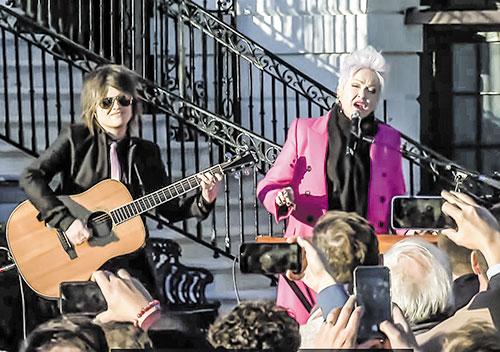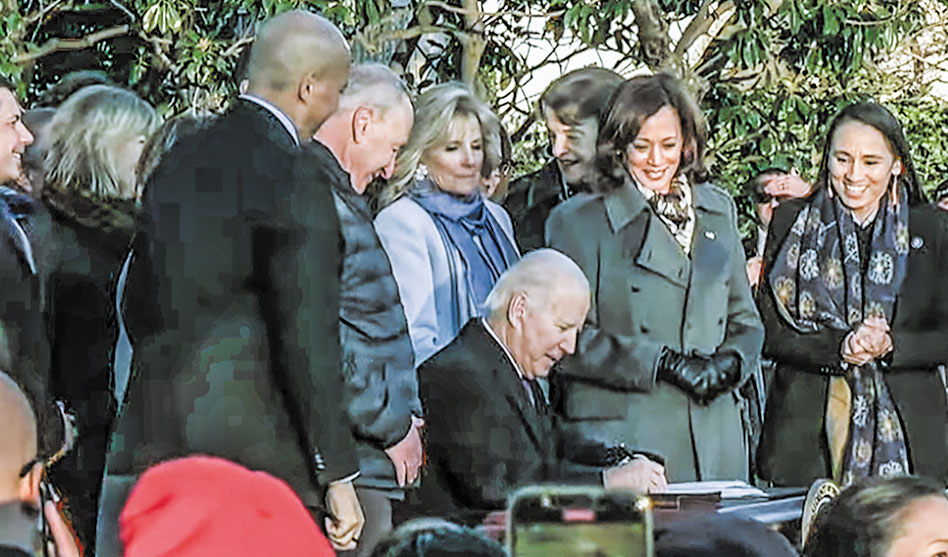President Joe Biden signs the Respect for Marriage Act as Vice President Kamala Harris, openly-lesbian Sen. Tammy Baldwin, openly-lesbian
U.S. Rep. Sharice Davids, First Lady Jill Biden, former senator Diane Feinstein and others look on.
(Screen cap from White House’s live video stream of the event)
Signing the bill enshrines the president as a champion for equality
DAVID TAFFET | Senior Staff Writer
taffet@dallasvoice.com
When he was vice president, Joe Biden famously came out in favor of same-sex marriage before President Barack Obama. And Biden’s son Beau helped pass Delaware’s law legalizing same-sex marriage. Delaware state Sen. Sarah McBride suggested the president’s continued support of marriage equality has been a way for him to carry on his son’s legacy.
That commitment to marriage equality culminated Tuesday, Dec. 13, in a signing ceremony at the White House to enshrine the Respect for Marriage Act into law.
Principle sponsors of the bill, including Sen. Tammy Baldwin and Speaker of the House Nancy Pelosi and leaders of national LGBTQ rights groups, gathered at the White House for the signing ceremony. Among those invited from Dallas was the Rev. Neil Thomas, senior pastor of Cathedral of Hope.
In his statement after passage of the bill, Biden said, “After the uncertainty caused by the Supreme Court’s Dobbs decision, Congress has restored a measure of security to millions of marriages and families.”
He said the new law would provide “hope and dignity to millions of young people across this country who can grow up knowing that their government will recognize and respect the families they build.”
THE SIGNING CEREMONY
Queer singer/songwriter Joy Oladokun and The Gay Men’s Chorus of Washington D.C. opened the signing ceremony held outside on the White House lawn. Cyndi Lauper and Sam Smith also performed.
Sen. Chuck Schumer spoke first, saying that passage of the Respect for Marriage Act was personal for him. The tie he was wearing, he said, was the one he wore to his daughter’s wedding, adding that she and her wife are expecting his third grandchild.
“My grandchild will get to live in a world that respects their mothers’ marriage,” he said.

LGBTQ ally and advocate Cindy Lauper performs her hit “True Colors” during the signing ceremony.
Speaker of the House Nancy Pelosi refused to take any credit for the bill’s passage, saying instead that “You, the American people, made this bill possible.” Respect for Marriage isn’t about tolerance, she added: “This is about respect.”
Pelosi said she was overwhelmed with emotion when she brought the gavel down after the bill passed. Noting that she ended her first term as Speaker by signing the repeal of Don’t Ask, Don’t Tell and sending it to the White House, Pelosi said this signing ceremony was a fitting end to her final term as speaker.
Biden came to the podium with Vice President Kamala Harris and their spouses. They were flanked on the White House stairs by marriage equality plaintiffs whose cases ended with the Obergefell decision.
Harris said in 2004, as California attorney general, she was proud to perform some of the first same-sex marriages in the country. One couple she married at San Francisco City Hall back then was on the White House lawn with their four children on Tuesday.
Marriage, Harris said, is a fundamental right, as are contraception and making decisions about your own body. “Rights are won only by those who make their voices heard,” she concluded quoting Harvey Milk.
“Today’s a good day,” Biden said to the crowd. “It’s a vital step toward equality for everyone.”
He joked about when, during an interview in 2012, he said he supported same-sex marriage, laughing that he “got in a little trouble on that one.”
The president went on to repeat themes other speakers touched on: respect, dignity, triumph for love. He also recounted the Loving case where an interracial couple married in D.C. and were arrested when they went home to Virginia. Then he went on to chide states that are debating and passing laws targeting trangender children.
“We need to let these children know they are loved,” the president declared.
Finally, Biden mentioned Brittney Griner and talked about having her wife in the White House. He held their relationship out as an example of what marriage means.
Biden then signed the Respect for Marriage Act into law surrounded by out officials like Transportation Secretary Pete Buttigieg and Rep. Sharice Davids. Also on the podium was Sen. Dianne Feinstein, who was the first to introduce a version of the new law to Congress.
WHY IT IS NECESSARY
Starting in 2003, when a court decision made Massachusetts the first state to allow same-sex couples to wed, marriage equality was slowly spreading with a patchwork of states legalizing marriage for gay and lesbian couples either through court decisions or legislative initiatives. That patchwork meant a couple could be married in Oklahoma, drive across the Texas border and suddenly be legal strangers again.
But the 2015 Supreme Court decision in Obergefell v. Hodges legalized same-sex marriage across the country. And everyone thought marriage was a settled issue — that is, until right-wing conservatives took the majority on the U.S. Supreme Court. New judges, who had sworn under oath during their congressional hearings that they believed in the concept of stare decisis — the idea that precedent settles points of law — broke with that principle by overturning Roe v. Wade, which had since 1972 guaranteed a woman’s right to an abortion.
Then Justice Clarence Thomas weighed in with a concurring opinion that invited the court to revisit the court’s opinions overturning sodomy laws, legalizing same-sex marriage and even the right for a married couple to obtain birth control. Interestingly, he didn’t question the right to interracial marriage, decided on the same constitutional points as the other items on his list, possibly because that would have affected his own marriage.
But with the threat of overturning marriage equality a sudden new reality, Congress acted quickly. Baldwin, the first out lesbian elected to the U.S. Senate, took the Respect for Marriage Act that had already passed the House and negotiated what she could get through the Senate. The final version, which had strong Republican support, does several things:
First, it repeals the Defense of Marriage Act, which prevented the federal government from recognizing same-sex marriage. DOMA, as the law was known, had already been declared unconstitutional by the U.S. Supreme Court in the Windsor case. But if Obergefell could be reversed, so could Windsor. So the new law repeals the (now) unconstitutional law.
Next, the Respect for Marriage Act requires states to recognize marriages performed in other states — both same-sex marriages and interracial marriages. But what the new law doesn’t do is require states to perform same-sex or interracial marriages or even recognize marriages already performed in the state.
So if Obergefell is overturned, Texas could theoretically deny recognition to marriages it has already legally sanctioned including any between same-sex couples and those that include anyone who is transgender.
As a compromise, a section was added called “No impact on religious liberty and conscience.” This refers to nonprofit religious organizations, “including churches, mosques, synagogues, temples, nondenominational ministries” and more. Not included are elected officials who simply decide that issuing marriage licenses to same-sex couples, although it’s the job they’re being paid to do, goes against their religious beliefs and they’ve decided not to do it.
No church would be compelled to offer its space for a wedding or celebration, and nothing in the new law changes any benefits, status or rights married persons are eligible for. And the law specifically denies federal recognition of polygamous marriages.
















